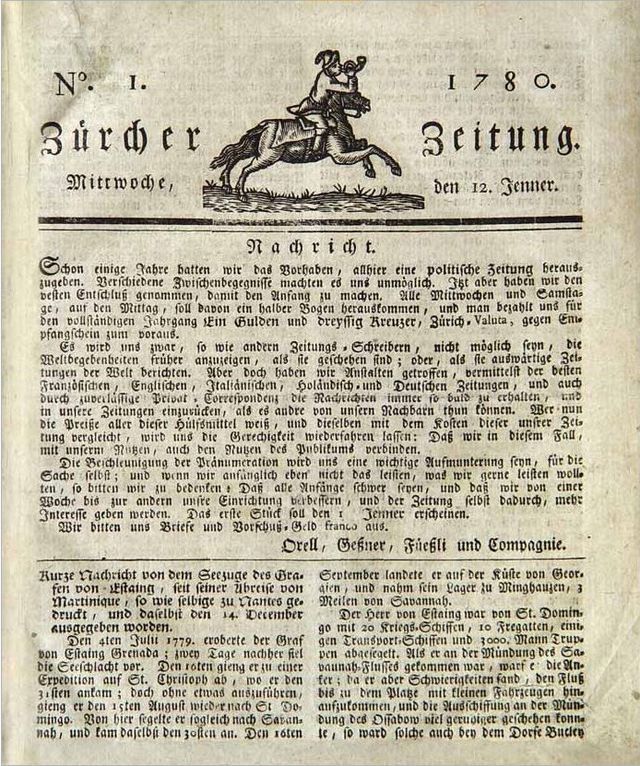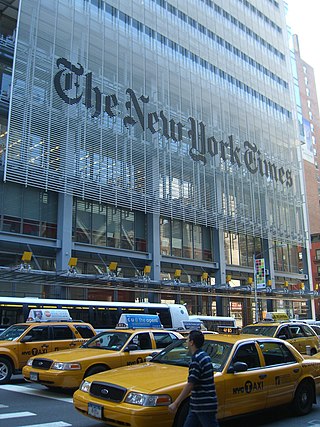Top Qs
Timeline
Chat
Perspective
Newspaper of record
Major newspapers that are considered authoritative From Wikipedia, the free encyclopedia
Remove ads
A newspaper of record is a major national newspaper with large circulation whose editorial and news-gathering functions are considered authoritative and independent; they are thus "newspapers of record by reputation" and include some of the oldest and most widely respected newspapers in the world. The number and trend of "newspapers of record by reputation" is related to the state of press freedom and political freedom in a country.[1][2]

It may also be a newspaper authorized to publish public or legal notices, thus serving as a newspaper of public record. A newspaper whose editorial content is directed by the state can be referred to as an official newspaper of record, but the lack of editorial independence means that it is not a "newspaper of record by reputation". Newspapers of record by reputation that focus on business can also be called newspapers of financial record.[1][2]
Remove ads
Newspapers of public record
Summarize
Perspective

A "newspaper of public record", or government gazette, refers to a publicly available newspaper that is authorized by a government to publish public or legal notices.[3] It is often established by statute or official action and publication of notices within it, whether by the government or a private party, is considered sufficient to comply with legal requirements for public notice.[4] Such gazettes may have minimal or no editorial content (opinion articles), and are focused on public notification of state services and state decisions; an example is Latvia's Latvijas Vēstnesis.[5]
In some jurisdictions, privately owned newspapers may register with the government to publish public and legal notices, or be otherwise eligible to publish such notices (terms used may include "newspaper of general circulation" among others).[6][7][8] Likewise, a private newspaper may be designated by the courts for publication of legal notices, such as notices of fictitious business names, if judicial and statutory standards are met.[9][10] These are sometimes called "legally adjudicated newspapers".[11]
Government organs
The term "newspapers of public record" can also denote those owned and operated by a government that directs their entire editorial content. Such newspapers, while pejoratively termed "state mouthpieces", can also be called "official newspapers of record", independently of whether they publish legal notices – distinguishing them from a gazette whose primary role is to publish notices, as their entire content represents the official view and doctrine of the state. This kind of official newspaper is distinct from newspapers of record by reputation, and is liable to fail the reputation criterion due to its governmental control. The word "official" can be used to distinguish them from "newspapers of record by reputation". Examples include Russia's Rossiyskaya Gazeta,[12] North Korea's Rodong Sinmun,[13] and China's People's Daily.[14]
Remove ads
Newspapers of record by reputation
Summarize
Perspective

The second type of "newspaper of record" (also "journal of record", or in French presse de référence) is not defined by formal criteria, and its characteristics vary. The category comprises newspapers that are considered to meet high standards of journalism, including editorial independence (particularly from the government and from its owners), accountability (mistakes are acknowledged), attention to detail and accuracy, and comprehensiveness and balance of coverage;[15] they are regarded internationally (as well as in their own country/region) by major global outlets.[16][17]
Despite changes in society, newspapers of record by reputation have historically tended to maintain a similar tone, coverage, style, and traditions; many are over a century old and some over two centuries old (e.g., Neue Zürcher Zeitung, The Times, The Guardian, Le Figaro, and The Sydney Morning Herald).[16] Newspapers of record by reputation can be respected for the accuracy and quality of their reporting and still be either ideologically conservative (e.g., The Wall Street Journal and The Telegraph) or ideologically liberal (e.g., The Washington Post and The Guardian).[18]
Although many countries are proud of their newspapers of record by reputation, in some countries they face an openly hostile state or political system that tries to suppress their press freedoms. Examples include Turkey's Cumhuriyet, where many of the staff have been imprisoned;[19] Panama's La Prensa, where staff have been shot and the owners forced into exile;[20] and Venezuela's El Nacional,[21] which was forced out of print when the state seized its assets (see examples of fallen newspapers of record).[22]
Etymology
The term is believed to have originated among librarians who began referring to The New York Times as the "newspaper of record" when it became the first U.S. newspaper in 1913 to publish an index of the subjects it covered.[18][23] In recognition of that usage, The New York Times held an essay contest in 1927 in which entrants had to demonstrate "The Value of The New York Times Index and Files as a Newspaper of Record". The New York Times, and other newspapers of its type sought to chronicle events, acting as a record of the day's announcements, schedules, directories, proceedings, transcripts, and appointments. By 2004, The New York Times no longer considered itself a newspaper of record in the original, literal sense.[24]
Over time, historians relied on The New York Times and similar titles as a reliable archival and historical record of significant past events, and a gauge of societal opinions at the time of printing. The term "newspaper of record" evolved from its original literal sense to that newer meaning.[23]
The derived term "financial (or business) newspaper of record" is attributed to The Wall Street Journal,[25][26] the Financial Times,[27] and to the Nihon Keizai Shimbun (Nikkei).[28] While newspapers of record by reputation are typically major widely-read national (and international) publications, subject-specific newspapers of record also exist (see examples of subject-specific newspapers of record).
Examples of existing newspapers
Examples of fallen newspapers

Over time, some established newspapers of record by reputation have lost their status due to financial collapse, take-over or merger by another entity that did not have the same standards or allowed increased government control and suppression of the paper's editorial independence. The existence of newspapers of record by reputation is an aspect of the level of press freedom and political freedom in a country, with major first-world democracies having several such newspapers (e.g. United States, United Kingdom, Germany, France, Canada, Italy and Japan); in contrast, countries that have seen a decline in their newspapers of record by reputation can represent a decline in levels of personal and political freedom (e.g. Zimbabwe, Venezuela, and Cambodia).[1]
Examples include:
- Zimbabwe's The Herald, lost its status as an established newspaper of record when it was eventually taken over by Robert Mugabe's Zanu-PF party.[188]
- Venezuela's newspaper of record, El Nacional,[21] was forced out of print by the state in 2018, and its headquarters was given to a high-ranking official.[22]
- London-based pan-Arab newspaper of record, Al-Hayat, ceased in 2020 due to financial and political pressures.[189][190]
- In Cambodia, the Hun Sen administration forced both of Cambodia's newspapers of record out of business using contrived tax fines that resulted in the closure of The Cambodia Daily in 2017,[191][192] and the sale of The Phnom Penh Post to a close ally of the Hun Sen administration in 2018.[193][194]
- Latvian newspaper Diena saw its established status as a newspaper of record diminish after a 2010 takeover, with the Historical Dictionary of Latvia (2017) listing it as "holding tenuously to a popular newspaper-of-record sentiment at home and abroad" due to "questions of ownership and if said owners influence newspaper content".[195]
- Népszabadság, Hungary's de facto newspaper of record, ceased publication in 2016 due to political and financial pressure.[196]
Remove ads
See also
Notes
- Successor to The Globe (founded 1844), The Toronto Mail (1872) and Toronto Empire (1887); papers merged in 1895 and 1936.
- Spun off from El Mercurio de Valparaíso (founded 1827).
- Named Berlingske Tidende until 2011.
- Founded as a successor to the discredited collaborationist Le Temps (founded 1861).
- Considered a successor to the Frankfurter Zeitung (founded 1856), banned in 1943 by the Nazis.
- Named The Bombay Times and Journal of Commerce until mergers in 1860–1.
- The Straits Times and New Straits Times were qualified as "semi-official newspapers of record" in the Encyclopedia of Journalism (2009) as "each is tightly connected to the dominant political party of their respective countries".[124]
- Spun off from The Straits Times (founded 1845) upon Singapore's independence.
- Merger of Algemeen Handelsblad (founded 1828) and Nieuwe Rotterdamsche Courant (1844).
- Dissolved in 1931 and revived in 1944, second dissolution in 1951, revived again in 1982.
- Merger of Journal de Genève (founded 1826), Gazette de Lausanne (1798), and Nouveau Quotidien (1991).
- Founded as The Manchester Guardian, adopted its present name in 1959.
- Named The Daily Universal Register until 1788.
Remove ads
References
Wikiwand - on
Seamless Wikipedia browsing. On steroids.
Remove ads








